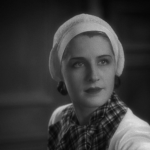 |
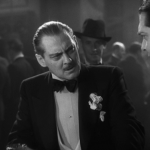 |
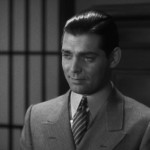 |
| Jan Ashe Norma Shearer |
Stephen Ashe Lionel Barrymore |
Ace Wilfong Clark Gable |
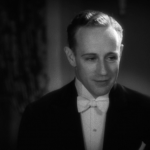 |
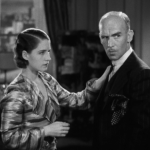 |
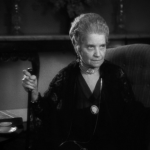 |
| Dwight Winthrop Leslie Howard |
Eddie James Gleason |
Grandma Ashe Lucy Beaumont |
| Released by MGM | Directed By Clarence Brown |
||
Proof That It’s Pre-Code
- The opening moments of the movie show Norma Sherer’s Jan nude in silhouette. She asks her father to bring her some underwear.
- One of Sherer’s dresses for this film is so sheer that you can see that it’s apparently quite chilly on set.
- Jan and Ace conduct themselves in a great deal of great premarital sex.
- When dressing down Ace, Stephen lists his crimes, besides being a mobster, as dealing opium and white slavery.
- Despite Prohibition, Stephen finds lots of alcohol readily available, which is exactly how he likes it.
- Stephen discovers his daughter’s affair with Ace and calls tells her, “Why, you’re nothing but a cheap, common, contemptable–“
- Stephen is an alcoholic, out and out, stating, “I’ve had to drink as I’ve had to breathe.”
- Ace explains that he’s sleeping with Jan: “She tossed all the ritz overboard months ago.” Not necessarily proof or anything, just an amazing arrangement of slang.
- One of these characters is murdered in cold blood, and, yeah, the murderer gets away with it.
A Free Soul: Class Warfare
“Young man, I’m sorry. It’s not your fault.”
“Yours neither, ma’am. A lot of people don’t believe that gag about being born equal.”
Sitting firmly on that line between daring and dull is 1931’s A Free Soul. The story of a father-daughter relationship and how it’s almost ruined by their vices has a strong start and a ludicrous finish– but, of course, we’ll get to that in a minute or so.
Jan Ashe (Norma Shearer) and her father Stephen (Lionel Barrymore) are members of the elite (and elitist) Ashe family and represent the twig on the family tree that no one wants to talk about. That’s fine with Jan and Stephen though– they have each other, and they’re the best of pals. Stephen is a successful lawyer who relies on his friend Eddie (James Gleason) to carry his flask while they’re in the courtroom. His latest case involves a gangland murder and a client named Ace Wilfong (Clark Gable) who apparently left his hat at the crime scene.
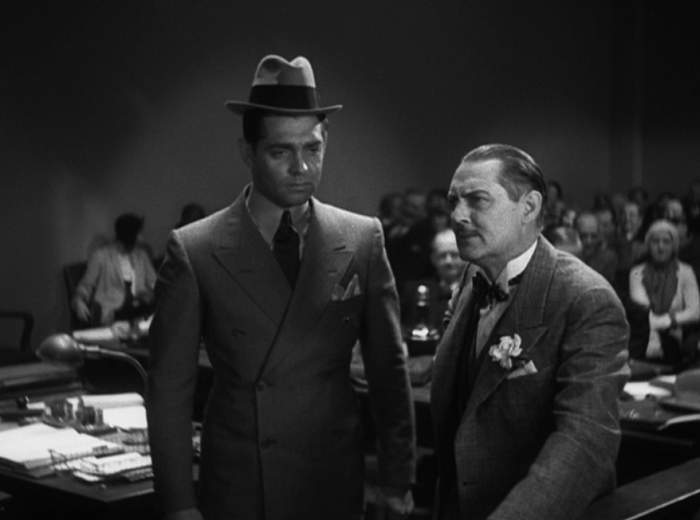
Dignity. Always dignity.
Ace and Jan meet right before his final day in court and, judging from the look Jan shoots him, she’s pretty concerned about just how tight that suit is– and what they can do to relieve the tension. Back on the outside after a successful defense that relies on hat sizes, Ace steals Jan away from a family shindig with her charmless fiance Winthrop (Leslie Howard). Ace and Jan are almost mowed down in a drive-by from a rival gang (thrilling Jan to no end), so they head back to Ace’s place above his casino, where one can readily assume a popped champagne cork and breakfast may be involved.
Months pass, and Jan’s entanglement with Ace grows while Stephen’s fondness for the bottle increases as well. It’s clear that Jan is just using Ace for sex, but he doesn’t see it that way and approaches Stephen one night about marrying her. Stephen is shown through much of the movie to be a kind, irascible guy who is a pretty nice drunk, which is why everyone seems to tolerate it. Once Ace proposes to marry his only daughter, though, he turns vicious. He burrows his eyes into Ace. “The only time I hate democracy is when one of you mongrels forget where you belong.”
What does that mean exactly? Up to this point in the movie, Stephen and Jan have been rich and carefree, eagerly distancing themselves from their conservative, old money family. But this moment allows Ashe to reveal that he’s not so far from the rest of the family tree on these matters, seeing Ace’s feeble attempts at social climbing as something that must be crushed without hesitation. But it’s a sobering moment for the audience as well; up to now, we’ve only really seen Ace from Jan’s perspective, as a sexy hunk with a big smile and a few dangerous hobbies. In reality– the reality Stephen knows and understands– he’s a crook, involved in activities that even the most modestly moral person would be disgusted by.
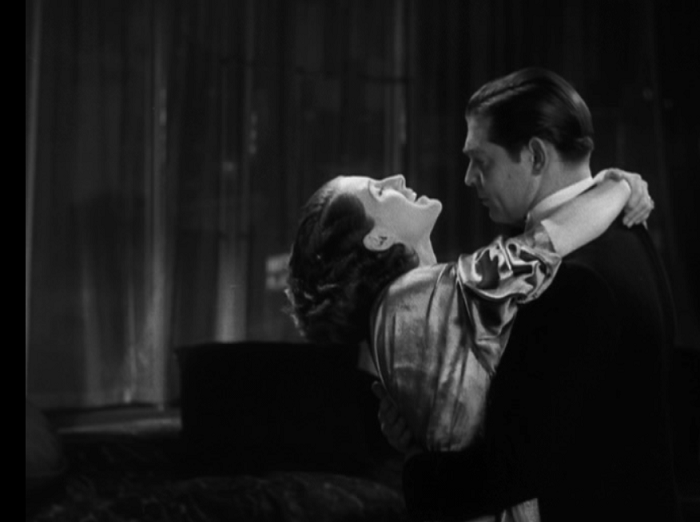
Love, American style.
But Jan’s written off this version of reality. Ace, spurned by her father, finds Jan in his apartment above the casino wearing a bathrobe. After they fight about their future, two things are clear: Ace wants a long term commitment, and Jan just wants him to stop talking and come closer. (This reversal of the usually perceived gender roles is one of the film’s highlights, though it doesn’t last long.)
That night there’s a raid in the casino, and Stephen is being drunk and disorderly. To shut him up, the gang tosses him up in Ace’s apartment, where he discovers Jan lounging in a robe. Seeing each other like this, with the nature of Jan’s illicit affair suddenly revealed, shames both of them. They silently leave and head back to their apartment.
Director Clarence Brown was one of MGM’s best in the 1930s, regularly turning in beautifully crafted films like Anna Christie and Sadie McKee. He captures a lot of emotion in A Free Soul, often hanging back for large moments and zooming in close for the quiet, passionate ones. Each frame is meticulously composed. Anyone who wants to understand his nomination for Best Director for this movie can get a taste from one beautiful shot that lasts only a few seconds but demonstrates Jan’s thought process changing in one quick, silent moment:
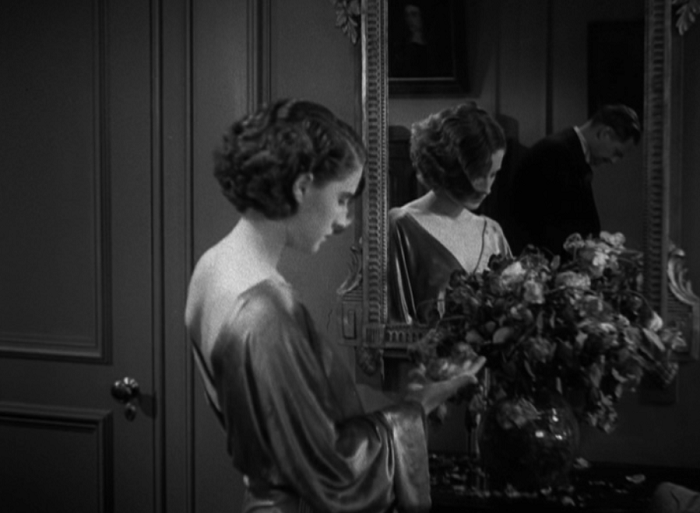
Returning to their apartment, Jan notices that the flowers on the table have decayed to the point that they crumble in her hand.
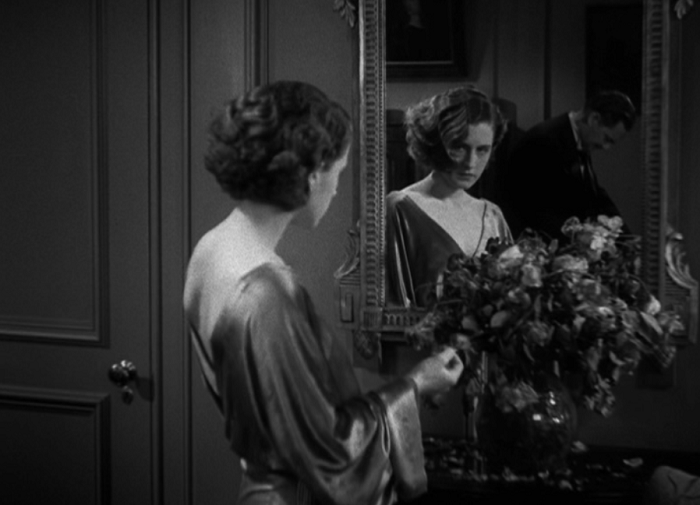
Jan catches a glimpse of herself, seeing herself for how she really is for the first time in months.
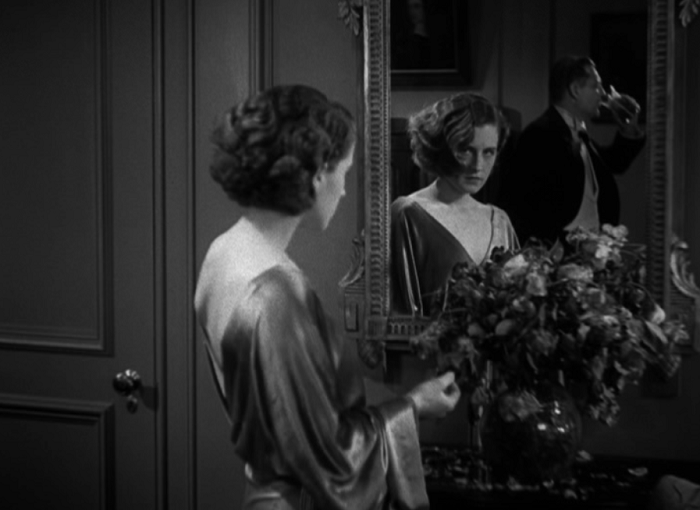
And then she sees the already-drunk Stephen in the background, downing another drink, and it finally clicks for her.
All in one brief, continuous shot, we see Jan suddenly snap back from her erotic euphoria. She confronts her dad with the truth– the past few months they’ve been indulging in their worst impulses, and it was making both of their lives worse. Jan promises to give up what she loves– hot Gable lovin’– if Stephen will get off the bottle. She suggests the two go on a retreat to clear out their systems, and Stephen, sensing this is his only choice to save his daughter, agrees.
Unfortunately, the film seems to lose its way after this moment. While the scenes of the two in Yosemite are fine, showing the real struggle for Stephen of breaking his alcoholism, we soon see that the entire fight is immediately for naught. As soon as they reenter town, he heads for a drug store and picks up a bottle. In fact, this sequence may be one of the most downbeat views of alcoholism you’ll get on film, suggesting that months of detoxing and love can be a complete waste because an alcoholic will always want alcohol, and they’re just lying in the meanwhile.
Stephen disappears– and, I’m sorry to say, his actual disappearance is goofy as hell. Jan and Eddie see him approaching with a bottle in his hand, and the rush toward him, but a train intervenes. After the train is gone, so is he, leaving the audience to imagine Lionel Barrymore holding onto one of the cars ‘Buster Keaton in “Cops”‘-style and chugging away.
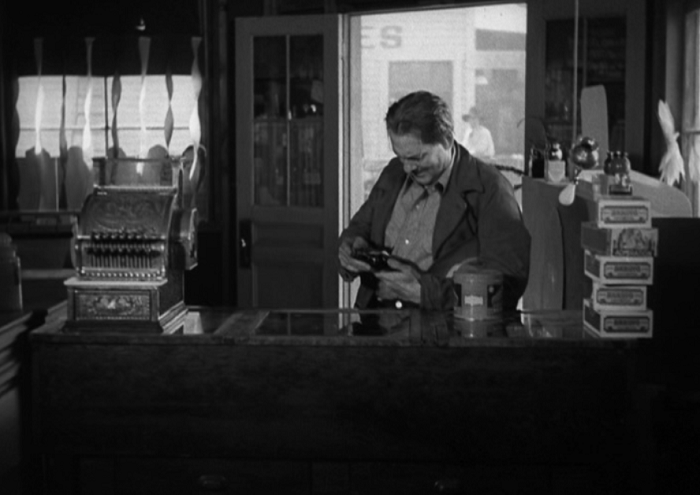
He downs the liquor, the Popeye theme starts playing, and he’s in courtrooms just punching juries through walls.
Deciding that if her father is off the wagon, she has no reason not to be, Jan returns to Ace. But instead of finding the big sexy lug she could push around, she finds a wounded, petulant man who demands marriage. It’s obvious before that Jan’s aloofness had kept him in his place, but now he feels he must be forceful if he is to get what he wants. This includes a few nasty threats, naturally, which Winthrop walks in on as they’re being delivered. Since Ace promises to start spreading rumors about Jan’s sexual activity unless she marries him, it looks like there’s not much she can do to save herself and her reputation from further harm.
Spoilers.
Before we get into the leap from Act 2 to 3, a brief reminder to my younger readers (who are reading this and not just looking for dirty pictures): when women spent the night at a man’s house in the 1930s, it was a scandal. If a woman from a respectable background was caught with a man who ran liquor, it may have made front page headlines– believe it or not, newspapers would use sex to sell copies. Jan’s indiscretions would wreck any future chance at a relationship from anyone other than a pity-filled male suitor, and the rest of her family would probably abandon her, leaving her to fend for herself in the unpleasant world of the Depression.
Luckily A Free Soul has a sucker– I mean, romantic interest– in the wings by the name of Winthrop. He goes to Ace’s casino and shoots the gangster in cold blood, calling the police immediately afterward to claim he did so over a gambling debt. Suddenly in love with Winthrop again because he’s such a nice guy, Jan scours the city to find her father so that he can successfully defend Winthrop from the charge of murder.
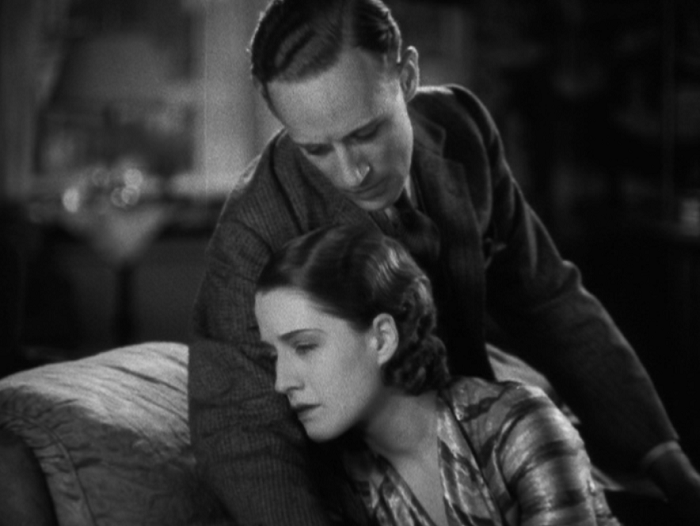
“It’s okay, darling. I’m unbelievably British, we don’t know what sex is anyway.”
A Free Soul isn’t the first pre-Code film to embrace the idea of ‘the natural law’, and it certainly wouldn’t be the last. That’s the ‘unwritten rule’ that men have a right to defend a woman’s virtue, up to and including murder if necessary. No one specifically invokes it, but it’s pretty much half of the basis for Stephen’s final, passionate plea: Winthrop killed Ace to protect Jan. Of course, the other half of Stephen’s defense is that he’s such a shitty parent that something like this is inevitable, which really only works when you die at the end of your plea. Which, as if on cue, Stephen does.
It’s a melodramatic, grandstanding moment, which fits the trajectory of the film’s last two acts for sure. But it also comes off as cheap. While Jan and Stephen’s relationship wasn’t perfect, him suggesting to her and permitting her freedom to live her own life shouldn’t be what damns him to die. In 1930s-sensibilities, Jan strayed from the path of good morality and must pay for it over and over again until she is sufficiently punished. Nowadays, it just seems like dramatic overkill, with every moment from Stephen’s disappearance calculated to ramp up the frantic, wild closing statement that Stephen delivers to the stunned jury.
End spoilers.
A Free Soul was designed as a follow up to the critical and commercial smash The Divorcee, which a year earlier had won Norma Shearer the Best Actress Oscar. Shearer adopts the same kind of sexually adventurous character here, though, unfortunately, some of her silent movie instincts, including a bit of over-gesticulating, stand out quite noticeably. She’s also out-shined by several of the other cast members. Clark Gable, in one of his first prominent roles, is utterly compelling and natural as Ace, a fascinating ball of sexual frustrations. And then there’s Lionel Barrymore, a well-practiced scene stealer, who is given a big, climactic speech of such magnitude that it’s easy to forget there’s anyone in the movie besides him up to that point.
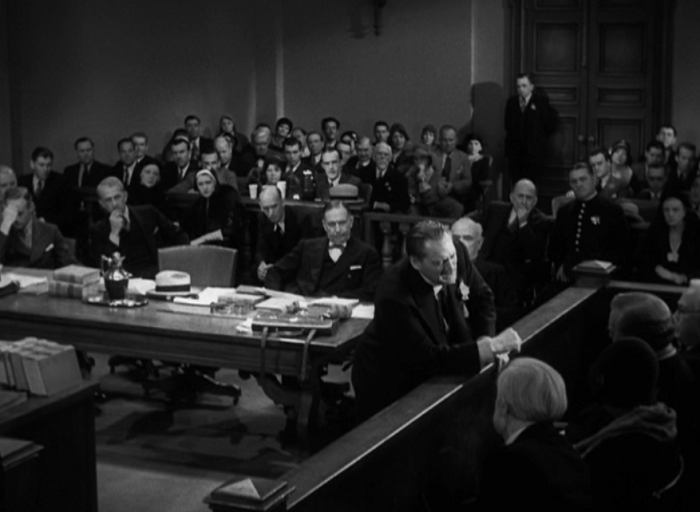
“You’re out of order! I’m out of order! The concept of order is out of order!”
Maybe it’s that lack of focus that hurts it. While it’s about the divergent paths of Jan and Stephen and the unhealthiness of their relationship, the chemistry between Shearer and Barrymore bridge what the movie is trying to paint as an off-kilter partnership. The idea that Barrymore taught her ‘wrong’ by making her the titular free soul never sits right, and feels downright classist in execution.
Or maybe just that the film’s morality is too damned old fashioned to relate to. Nowadays, given the option to sleep with a young Clark Gable, who the hell would say no?
Gallery
Hover over for controls.
Trivia & Links
- A more in-depth discussion of this movie is available in 3rd issue of The Pre-Code Companion. You can also see other available issues and topics covered in the series by clicking here or on the banner below.
- Film fans will obviously catch on that this movie casts Leslie Howard and Clark Gable as two sides of a romantic triangle eight years before they were cast in the same basic parts in Gone With the Wind.
- The incomparable Movie Diva uses this one to talk about the reevaluation of Shearer’s career over the years, as well as her famous costumes from the film, all designed by the legendary Adrian:
It was a mark of prestige that an actress could require “Gowns by Adrian” in her contract. As head designer, Gilbert Adrian chose the films on which he wished to work, reporting only to studio heads Louis B. Mayer and Irving Thalberg. “When Adrian made a sketch, no producer or director dared to change it” according to John B. Scura, who toiled in the MGM wardrobe dept for 41 years. Shearer would get two versions of a gown, from which she could choose, a major concession, I’m sure. Hedda Hopper wrote, “Because his clothes are worn by the biggest stars in the biggest pictures he has had more influence on women’s clothes than any man in history.” (Laura Jacobs) And, for anyone who loves old movies, his clothes are still the objects of panting desire.
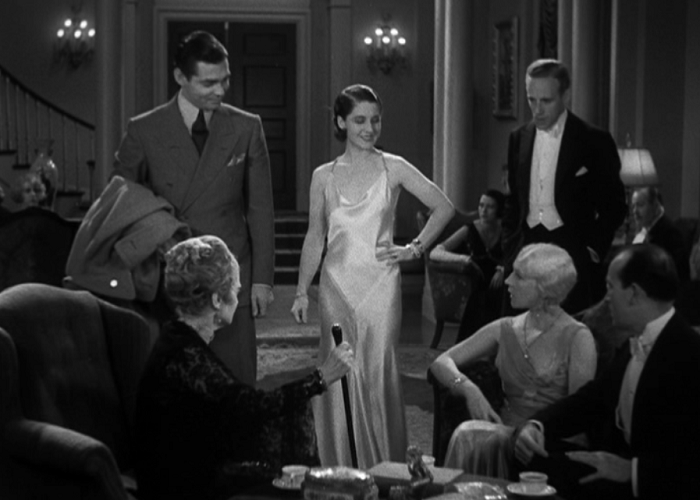
Speaking of fashion, this shear dress on Shearer is sheer delight! (ha ha kill me)
- Mordaunt Hall’s review in the Times is less than enthused:
Talking pictures are by no means elevated by the presentation of “A Free Soul,” last night’s screen contribution put on at the Astor. Nevertheless, it should be stated that Lionel Barrymore does all that is possible with his role.
- Michael Asimow talks about the origins of the character of Stephen Ash, a lawyer named Earl Rogers and how substance abuse is rampant among lawyers.
- Here’s a longer, more detailed breakdown at Once Upon a Screen including much more discussion of Gable’s place at MGM. And here’s Dear Mr. Gable highlighting the film with quotes and more background info.
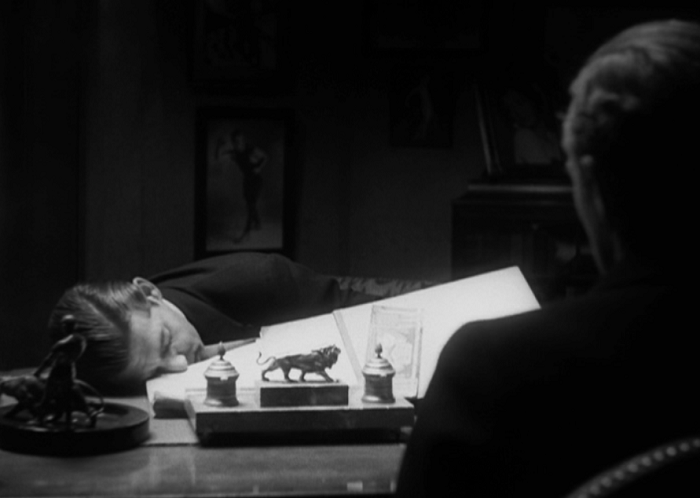
No, it’s fine, Clark, take a nap. See if we care.
- Cliff at Immortal Ephemera only has a brief rundown on this one, but he touches on a few of the same things I did and has a couple of really nice memorabilia photos attached.
- Well, I couldn’t find a trailer for it, but here’s clips of A Free Soul set to Lady Gaga’s “Bad Romance”. And this was not the only song I found attached to clips of the movie, but is definitely by far the one that makes the most sense.
Awards, Accolades & Availability
- This film is available as part of the Forbidden Hollywood, Volume 2 set along with The Divorcee, Three on a Match, Female, and Night Nurse. You can pick it up over at Amazon.
Comment below or join our email subscription list on the sidebar! |
||
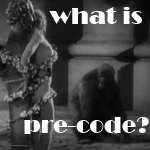 |
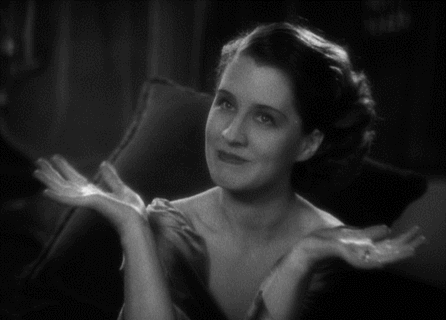 |
 |
 |
 |
|

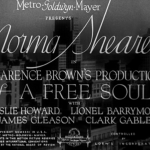
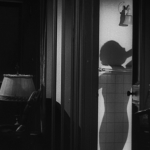
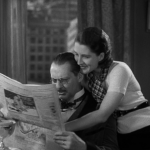
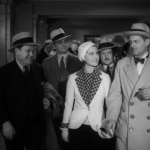
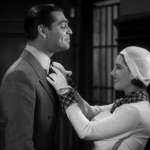
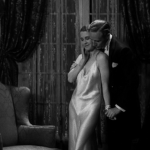
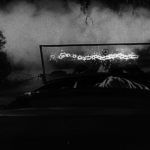
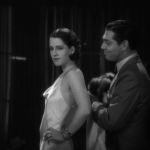
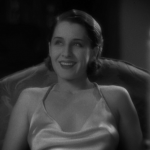
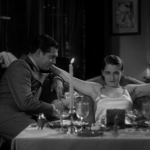
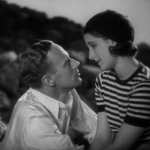
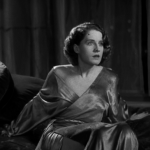
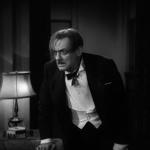
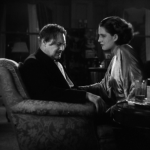
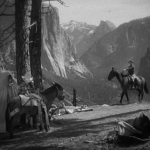
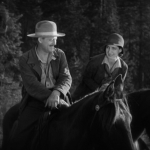
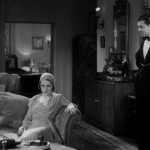
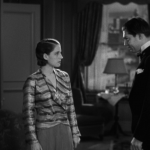
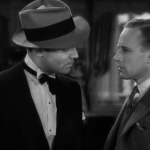
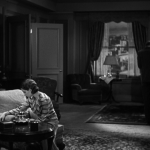
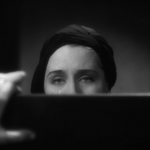
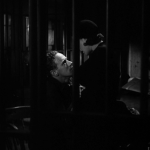
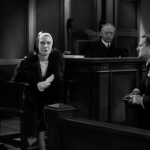
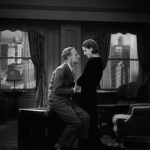

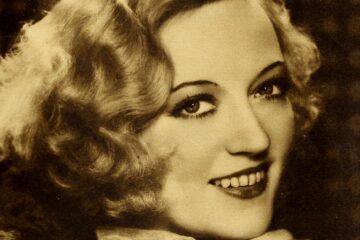
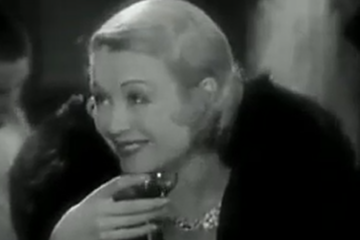

8 Comments
Kelly · June 5, 2014 at 8:03 am
Free soul is my introduction to pre code beside the Divorcee I thought all this time Norma Shearer was goody goody actress until I seen this movie boy she was slut city LOL!
Danny · June 7, 2014 at 3:31 pm
This may be my favorite comment on the site. Thank you.
Lard · January 7, 2015 at 7:03 am
Slut city indeed. But she looks good enough to get away with it – much more attractive than she was in “The Divorcee”. I guess we can give good old Adrian credit for that. Which means Adrian is also a slut.
She has better leading men in this one than Mack-truck-faced Chester Morris.
Danny · January 8, 2015 at 10:57 am
It is admittedly hard to do much better than Clark Gable. Though I’m not sure I’d ever go with Leslie Howard over Morris, personally.
And you’re right– the movie is as lot better looking than The Divorcee– better direction, maybe, and certainly better costuming.
nitrateglow · November 12, 2015 at 12:44 am
I was disappointed with this one too. The Victorian sexual morality that creeps in at the end was such a bummer. Surely they could have come up with a better ending than that? Or given Jan a better alternative to Ace than Winthrop at least.
Danny · January 8, 2016 at 12:53 am
Yeah, the second half is jarring compared to the first– it’s too easy for Jan, and her father pays for her crimes rather than her. It’s too old fashioned, I’m afraid.
Pitmann · August 31, 2016 at 4:04 pm
Norma had sexy looking armpits in this film
Jesús · March 29, 2020 at 2:50 am
Only Norma could eclipse Gable on screen. Their first kiss and the next two minutes show her awsome
Comments are closed.